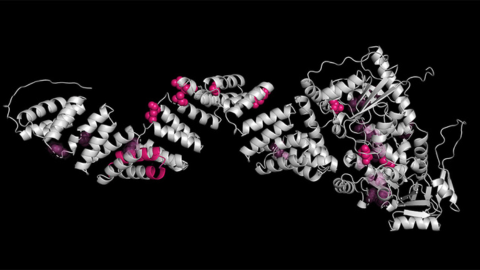Using your science beyond the bench
Those with a Ph.D. in the biomedical sciences seem to fall into one of two camps: you either love academia, or you can’t wait to go somewhere else. Without reservation, I can say I have always been in the former camp. I love everything about academia — the campus environment, the intellectual stimulation and freedom, the students, the anticipation of a new year in August or September, and the joy of wrapping up a year in May or June.

When I made the decision not to be put forward for promotion and tenure four years ago (knowing it would very likely not be successful), I did so purposefully so that I could leave open the possibility of staying at my institution in some capacity. I wasn’t sure what that would be, but after serving as a principal investigator for many years, I thought I had developed some transferable skills and knew I had developed many interests beyond the bench.
I was fortunate enough to land on my feet in an administrative position at my institution that I adore. In fact, it was as if I had been meant to do this all along. Using those transferable skills? You bet! Multitasking, bringing groups of people together, networking, effective communication, project management, writing, and on and on. And what about pursuing those nonresearch interests of mine? Absolutely. My role integrates all of the things that I cared about as a PI but didn’t have sufficient time or energy to pursue as much as I wanted, including science advocacy, teaching, program development, communications and outreach.
So I got lucky, but how common are these types of nonresearch positions in academia? It is hard to pinpoint the numbers with any certainty, but estimates suggest that 18 percent of positions filled by Ph.D. scientists are science-related nonresearch jobs (1). These include jobs in the private, government and nonprofit sectors as well as academia.
These types of positions can look very different from institution to institution and even within an institution. For example, there are many types of administrative positions that benefit from or even require a Ph.D. in the sciences, including pre- and post-awards grant administration, research administration, center/institute administration, faculty affairs and education (e.g., graduate or postdoctoral affairs). In fact, assistant or associate dean-level administrative roles often do not require the individual to be a faculty member, contrary to what it may seem.
Beyond administration, program and project management positions can be a good fit for a Ph.D.-level scientist, including leading projects in a focused research area or directing specific education programs, for example. Additionally, shared resources (aka core facilities) often have Ph.D. scientists as technical directors who manage the facilities, oversee personnel and budgets, and contribute to collaborative research projects. Some academic institutions use doctoral-level scientists on their communications teams to promote their scientific accomplishments to a wide range of audiences. And finally, some institutions are hiring Ph.D.-trained scientists in their career centers. Who better to help guide future scientists than those who have lived it?
Knowing about these different positions is a necessary first step, but to get a feel for the type of role that is right for you, you will have to explore them carefully. If you are a student or fellow, try to find individuals who have jobs like these at your institution and conduct an informational interview (hint: almost no one says no to this). What do they do every day? How much or little are they using their science background? What is the best part of their job? The worst? Do they work on a team? And if so, do they enjoy it? How is the work-life balance?
With this information in hand and a strong sense of what your ideal job would be, it’s time to find available positions. Some of these jobs will be listed where you are finding other careers for scientists, but you may need to explore individual institutions’ job postings as well as sites like HigherEdJobs.com. Job titles can be confusing and daunting (and vary immensely among institution and even units within institutions), which means you need to read the job description and qualification requirements very carefully. And if you have questions, don’t hesitate to ask.
During the application and interview process, it’s important to sell yourself and clearly describe the talents and experience you will bring to the table. This is especially important if this will be your first job outside of research, since you may not have much experience that seems directly relevant. Furthermore, being prepared, asking good questions and showcasing your genuine interest and excitement about the position will go a long way toward demonstrating that you are ready for the transition from research. Explain clearly and concisely how this role is a great fit for you. The truth is they should want to find the best fit for the open position as much as you want to find the best fit for you.
And what is the outlook for these types of nonresearch careers in academia for Ph.D. scientists? Again, it is difficult to put numbers on it, but my sense — and the sense of many of my colleagues — is that institutions are putting more value on what Ph.Ds. can bring to all aspects of the academic environment. From administration to career advising to program management, more and more of these jobs seem to be available. That’s good news for academia and really good news for you if this type of career is what you are looking for.
Enjoy reading ASBMB Today?
Become a member to receive the print edition four times a year and the digital edition monthly.
Learn moreFeatured jobs
from the ASBMB career center
Get the latest from ASBMB Today
Enter your email address, and we’ll send you a weekly email with recent articles, interviews and more.
Latest in Careers
Careers highlights or most popular articles

Upcoming opportunities
Friendly reminder: May 12 is the early registration and oral abstract deadline for ASBMB's meeting on O-GlcNAcylation in health and disease.

Sketching, scribbling and scicomm
Graduate student Ari Paiz describes how her love of science and art blend to make her an effective science communicator.

Embrace your neurodivergence and flourish in college
This guide offers practical advice on setting yourself up for success — learn how to leverage campus resources, work with professors and embrace your strengths.

Upcoming opportunities
Apply for the ASBMB Interactive Mentoring Activities for Grantsmanship Enhancement grant writing workshop by April 15.

Quieting the static: Building inclusive STEM classrooms
Christin Monroe, an assistant professor of chemistry at Landmark College, offers practical tips to help educators make their classrooms more accessible to neurodivergent scientists.

Unraveling oncogenesis: What makes cancer tick?
Learn about the ASBMB 2025 symposium on oncogenic hubs: chromatin regulatory and transcriptional complexes in cancer.

